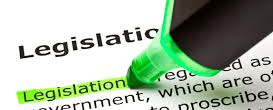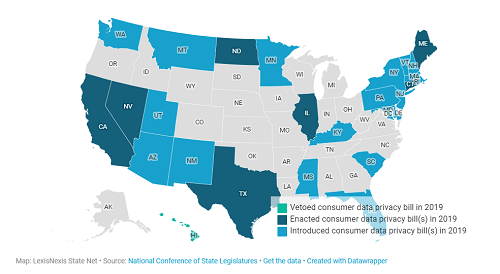
11.25.19 – State Net Capitol Journal –
It’s the holiday season, and if most voters are thinking about politics at all they are probably pondering more about how to get through family festivities without a major blowup over differing political philosophies than they are about next year’s legislative agendas.
But rest assured, those agendas are absolutely being hammered out anyway.
As is our tradition here at the State Net Capitol Journal, our final three issues of this year will offer our perspective on issues we think will play big in statehouses in the coming year. Forty-six states are in session in 2020, and many of them have been pre-filing bills since September 1. While the thousands of bills state lawmakers will address will cover a much more vast array of topics than we will present this week and next, these are definitely areas where lawmakers will be spending a lot of time and energy.
Data Privacy/Security – If any issue can compete with the myriad concerns of what promises to be one of the most contentious election years in memory, it is this one. On January 1, the wide-ranging California Consumer Protection Act goes into effect, ushering in what promises to be an ever-growing effort at the state level to give consumers more control over how their personal data is managed, sold and protected. And the Golden State is not alone – Maine and Nevada already have similar laws, while bills are pending in Massachusetts, Minnesota, Pennsylvania, New Jersey, New York and Washington. More will follow. An increasing number of high-profile private sector data breaches and local government ransomware attacks will also assuredly spur more legislation around data security for both the private and public sectors.
Gig economy – California Assembly Bill 5, legislation imposing a so-called “ABC test” for determining whether a worker is an employee or an independent contractor, roiled California for most of 2019. Opponents claim the law will effectively destroy the fast-growing gig economy, while supporters say it will stop gig employers from unfairly and illegally taking advantage of workers by misclassifying them as contractors. The law, which goes into effect in January, is already the subject of a ballot measure seeking to overturn it, and many lawmakers on both sides of the issue are already planning bills to amend it. But how far – or even if – the law inspires similar legislation in other states remains to be seen. Some states already have some form of an ABC test, and Washington, New Jersey and New York are among those where lawmakers have said they will seek to implement one as well.
Drug prices – There has been a wealth of talk at the federal level on possible steps for reining in rising prescription drug costs. But states have been taking their own steps for years now, with 33 states enacting 51 different laws this year intended to bring down those costs. Those laws cover a range of possibilities, including allowing the import of medications from outside the U.S., requiring drug makers to justify price increases and imposing new disclosure requirements on pharmacy benefits managers (PBMs). One even more specific movement: states moving to cap the consumer cost for insulin. To date only Colorado has officially taken that step, but lawmakers and others are reportedly working on similar bills in Kentucky, Ohio, Pennsylvania, New Hampshire, Michigan, Virginia and Minnesota. With D.C. locked in perpetual partisan discord, expect more of the same in 2020.
Medicaid expansion – Thirty-six states and Washington D.C. have expanded Medicaid coverage under the Affordable Care Act. Of the fourteen that have not, there is a legislative or ballot measure effort underway to do so in all but Mississippi. The most likely legislative possibility is in Georgia, where Gov. Brian Kemp (R) recently unveiled a plan that would expand Medicaid, on the condition that recipients meet mandated work requirements. There are currently a handful of states also awaiting a decision from the federal Centers for Medicare and Medicaid Services on requested expansion waivers, and one state – Tennessee – is seeking to become the only state to receive federal Medicaid funds in the form of a block grant.
Sports Betting – Since the 2018 Supreme Court ruling that allowed states to adopt their own sports betting laws, 19 have done so, though to date only seven have active operations up and running. Bills to legalize sports wagering have been introduced in a large majority of the remaining states, including Florida and California. With gaming experts estimated that about $150 billion in illegal sports bets are made each year, it is highly likely that a number of states will also go all in on legal sports wagering in 2020.
Vaping bans – A wave of vaping-related illnesses and deaths across the nation has already prompted several governors and public health agencies to impose temporary bans or restrictions on the sale of e-tobacco products. At least five more states introduced bills this year to ban vaping, and more are sure to follow in 2020.
Cannabis/Hemp legalization – Since 1996, 33 states have legalized medicinal marijuana use, and 12 more have also authorized recreational use. According to the investing website Motley Fool, efforts are underway in at least nine states – Arizona, Arkansas, Florida, Idaho, Mississippi, Missouri, Nebraska, New Jersey, North Dakota and South Dakota – to get a recreational-use ballot measure before voters next November. While legislative proposals are being put together in New York, Connecticut, Rhode Island and Pennsylvania, to date only Vermont and Illinois have legalized recreational marijuana use via legislation. The other 10 have done so via voter approval.
An interesting debate to watch will come in South Dakota, where Gov. Kristi Noem (R) earlier this year vetoed a bill to legalize the cultivation of industrial hemp. Noem said hemp was creating problems for law enforcement because it was too difficult for officers to discern from illegal marijuana. South Dakota is one of only three states – along with Mississippi and Idaho – to bar the cultivation of industrial hemp. But if lawmakers follow through on their vow to send her a new hemp legalization bill this session, advocates believe they have the votes this time to override another veto.
Paying student athletes – A new law in California allowing college athletes to profit from the use of their name, image or likeness appears to be the rare issue these days that has strong bipartisan support. Similar bills are already introduced or waiting to be filed in Colorado, Florida, Illinois, Kentucky, Minnesota, Nevada, New York, Pennsylvania, South Carolina and Washington. Bills are also being considered in Connecticut, Ohio and Maryland, with many more states likely to follow suit.— By RICH EHISEN
Consumer Data Privacy Bills Introduced in Half of States in 2019

As of mid-October, 26 states had introduced legislation this year dealing with the privacy of consumer data, according to analysis of LexisNexis State Net legislative data by the National Conference of State Legislatures. Seven of those states had enacted such measures, including Hawaii, where a consumer data privacy bill (HB 702) was vetoed by Gov. David Ige (D).
